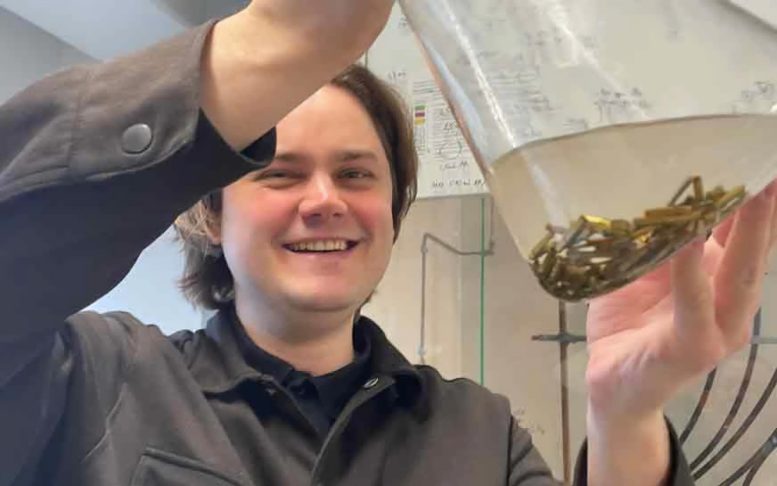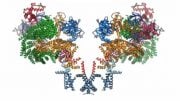
Postdoctoral Researcher Anže Zupanc tested organic solvents on crushed circuit boards, successfully extracting the gold and copper contained in them. Credit: Riitta-Leena Inki
Waste computers and cell phones, solar panels, and other electronic waste are becoming an important source of noble metals alongside mining. Researchers at the University of Helsinki have developed sustainable dissolution methods for noble metals.
The extraction methods currently in use consume a lot of energy and are detrimental to the environment. The method of roasting is particularly dangerous for its practitioners and the environment, into which it releases hazardous chemicals, alike. In developing countries, noble metals are to this day extracted under crude conditions in landfills.
Even though advanced hydrometallurgical processes are safer and able to dissolve noble metals, the result is metal mixtures that require further processing.
Innovative Research in Metal Extraction
Recent research led by Professor Timo Repo of the Catalysis and Green Chemistry research group has been published in the journal Angewandte Chemie. The article introduces a three-stage process where copper is first dissolved from electronic waste, followed by silver and, finally, gold. This way, metals can be selectively separated from plastic, ceramics, and other materials, yielding pure noble metals. In addition, the solvents used can be easily recycled.
Practical Applications and Environmental Benefits
Researchers at the University of Helsinki tested organic solvents on crushed circuit boards, successfully extracting the gold and copper contained in them. Silver was separated from crushed old solar panels. This result is particularly interesting because solar panels are a high-volume product whose recycling has thus far been extremely challenging.
“In this study, we used what are known as deep eutectic solvents, liquids, that are made from substances that are solid in room temperature and under normal pressure, such as choline chloride – also used in poultry feed – and urea, as well as other safe organic compounds,” says Postdoctoral Researcher Anže Zupanc from the Department of Chemistry, University of Helsinki.
Deep eutectic solvents are a special type of solvent composed of two or more simple compounds, which together form a mixture with a low melting point. These solvents are known as deep eutectic, as their melting point is considerably lower than the melting point of each component on its own.
Deep eutectic solvents are environmentally friendly, renewable, and in many cases biodegradable. They have many applications as solvents, including in chemical reactions, catalysis and extraction techniques.
Solvent Reusability and Green Chemistry
In this study, lactic acid has also been used as a solvent and hydrogen peroxide as an oxidant.
“An important result was that the solvents could be reused, putting the principles of green chemistry into practice,” Professor Repo notes.
According to Repo, the results obtained in laboratory conditions constitute a significant step towards sustainable chemical processes.
Reference: “Sequential Selective Dissolution of Coinage Metals in Recyclable Ionic Media” by Anže Zupanc, Joseph Install, Timo Weckman, Marko M. Melander, Mikko J. Heikkilä, Marianna Kemell, Karoliina Honkala and Timo Juhani Repo, 14 May 2024, Angewandte Chemie International Edition.
DOI: 10.1002/anie.202407147









Are these metals exstracted from the trashed items first be for the solvent is applied.Plusis the copper silver and gold separated away from each other when solvent has melted themselves.
Exacting recipes for the issue tactic materials and their use would be a big boon to people wanting to do this on their own